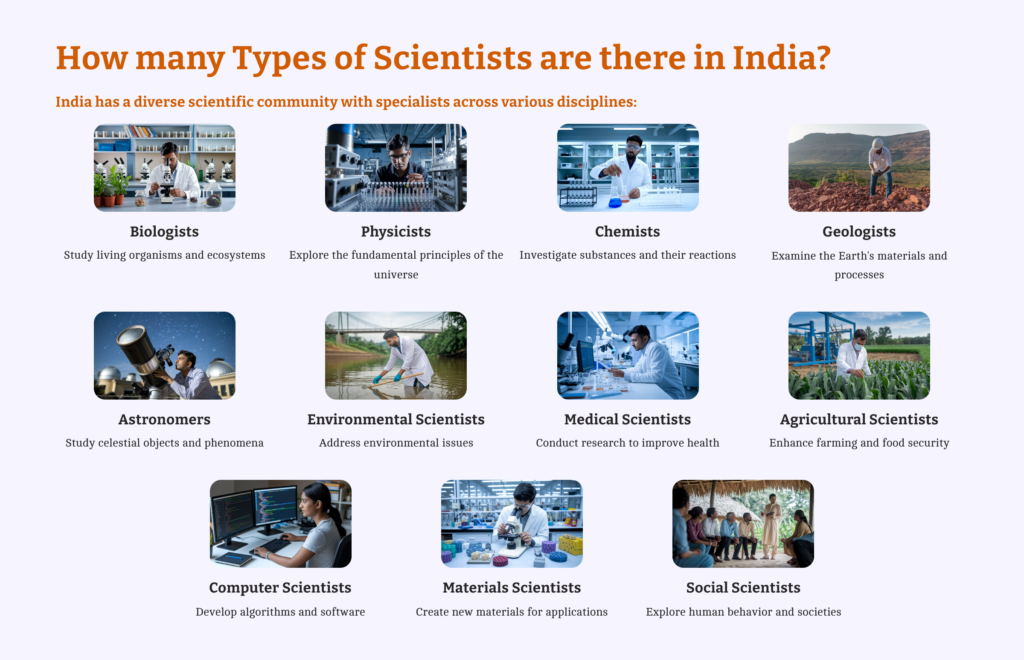

Quick Summary
Science is one of the most sought-after fields in India. The country has seen an increase in the setup of various R&D centers. In PhDs in science and engineering, India ranked third in 2024. If you are among the science enthusiasts, this blog will help you how to become a scientist.
A scientist researches in a chosen field of science. Becoming a scientist requires high dedication and passion for the subject. Because of scientists worldwide, the human race has advanced to this level. The importance of science and scientists only keeps on increasing day by day.
India features some of the most prominent higher education institutes in the world. These institutes have a dedicated approach to research and development and are often on the lookout for high-quality scientists.
This article covers all you need to know about how to become a scientist.
A scientist is an individual who learns about the natural world to gain a deeper understanding of various phenomena. They use methods such as observation, experimentation, and analysis to gather data and test hypotheses. Scientists work in diverse fields, including biology, chemistry, physics, medicine, and environmental science. Their research contributes to advancements in knowledge and technology.
Science is a vast field. Different types of scientists have different roles and jobs. Today, scientists are no longer limited to laboratories. There are fields in which scientists are required to work in multiple environments. They may also need certain other skill sets based on their work requirements.
There are 10 types to become a scientist & these include:


Scientists do important work in labs and the field across many areas like medicine, physics, biology, chemistry, computer science, and environmental science. Here’s a simple breakdown of what they do:
These activities are essential for advancing science and understanding the world around us. For more information about what scientists do, check out resources like Indeed and Science Careers.

Research scientists are essential for advancing science and technology. Their work leads to important discoveries and innovations that can greatly affect our lives. For example:
The role of research scientist goes beyond just working in labs. Their findings help shape government policies, promote technological advancements, and boost economic growth. For instance:
If you’re interested in becoming a scientist in India, here are some steps to follow:
By following these steps, you can become a scientist and contribute to important advancements in science that benefit society.
In India, there are various types of scientists, each focusing on different fields of study. Here’s a simple overview of the main categories, along with a brief description of each:

These categories represent just a few specializations within the scientific community in India. Each type of scientist plays a crucial role in advancing knowledge and technology in their respective fields.
Being a scientist often requires years of hard work and study. You also need to be genuinely fascinated with your chosen subjects. There are many required qualifications to become a scientist. This depends on the nature of the job that you aspire for too.
Wondering how to become a scientist after completing the 12th standard? Your high school education lays the foundation for your career as a scientist. At this stage, students gain a general idea of the subjects available to them. This helps them gauge subjects they might wish to pursue further.
Another important point is to gauge your skill level in your subject of interest. After completing the 10th standard, take up a science stream.
In India, there are usually two options- PCM or PCB, with Physics and Chemistry being common – Biology or Mathematics. There is also the option of all four subjects. Choose this if your area of interest is something like biotechnology.
Without having this background in science, students cannot pursue bachelor’s level science courses. This education greatly helps in preparing for competitive exams such as JEE or NEET. Some of the top science institutes in the country select students based on the scores of these exams.
There are four broad categories that students can pursue – Mathematics, Biology, Physics, and Chemistry. Various subjects come under these four subjects. However, students require a basic understanding of all four to prosper in their careers.
After high school, students can pursue bachelor’s level degrees such as –
Upon completing such programs, students gain a better understanding of their skill sets and interests. These scientific career paths can guide you to your goals.
A degree in science is required to start a career in science. This helps develop a basic skill set to ensure a successful career in science.
Students who have a master’s degree in addition to a bachelor’s degree are eligible for doctoral-level programs, like a Ph.D. program. Typically, students pursue research in their areas of interest.
Some universities also have the option of Ph.D. students acting as guidance counselors.
However, to enroll in top universities and colleges, aspirants must have a track record of good scores. If studying science is something you genuinely enjoy, this shouldn’t be difficult to achieve.
Also Read: Steps to Becoming a Data Scientist
A Bachelor of Science (BSc) typically takes 3 years to complete, while integrated courses may extend to 5 years. A Master’s degree usually requires an additional 2 years, and a PhD can take 3 to 4 years to finish. Additionally, positions in reputable laboratories, research facilities, and teaching roles often expect candidates to have several years of relevant work experience.
The science field is complex and demanding. You need different skill sets to be able to work with various types of scientists in India.
If you are inherently inquisitive about science, then research is the best field for you.
Scientists have to often think out of the box to solve complex issues. This is one of the most obvious skills required to become a scientist.
In science, you rarely get quick results in your work. You must learn to remain patient and determined. This trait is one of the most important skills required to become a scientist.
Time and again, scientists come across unexpected results during their research. Being open-minded is one such skill to have to adapt to and accept new ideas.
Communication is important in all job types and scientists are no exception. Scientists have to be able to explain their work to their peers, their teams, and other people. Good communication skills can help in improving their careers.
Good management works wonders. Scientists have to manage their time well to complete their tasks on time.
Science is a vast field. There are many specializations that you can choose from if you wish to become a scientist. The five basic subjects – mathematics, physics, chemistry, botany, and zoology – further branch into many other disciplines.
Opportunities in the field of science are never-ending. Whichever subject you choose today, many research institutes and centers cater to various specializations. Based on your skills and interests, opt for your program of choice.
Work experience is highly valued in the field of science. With a constant need for scientists, you can get exposure. It is also recommended to gain as must work experience as you can.
Scientists can also work in private companies in research and development teams. Some of the top private companies offer the most competitive salaries to scientists. You can only reach this level through outstanding work.
Public sector institutions such as ISRO, DRDO, etc., offer lucrative offers to scientists in relevant fields. There are many types of outstanding scientists that you can choose to work with in India. These prestigious institutions offer many perks in addition to good salaries.
ISRO hires scientists and engineers to work on space missions, satellite development, and research. Here’s the pathway:
DRDO focuses on defense technology, missiles, radars, and AI-based systems. It recruits scientists in various technical and research roles.
NASA recruits scientists in various domains, including space research, physics, robotics, and aerospace engineering.
India has many top science research institutes today. These institutes offer education and training for scientists across many fields. Some of them are listed below.
Many such private and state universities offer great science courses. Research institutes in India continue to improve and are ranked well across the world. There are more than 20 IITs across the country offering excellent levels of education.
You can become a scientist by mapping a career path right after the 12th standard. You must have an idea of what you want to study to become a scientist. Shortlist the programs you wish to pursue and the universities that offer them.
Gauge your skills and interests and compare those with your shortlisted programs. This will help you choose an appropriate institution per your interests.
As we constantly strive to improve and innovate, every field requires research and development. This makes scientists needed across all sectors. Depending on your level and subject of education, there are numerous job prospects in the field of science in India to become a scientist:
Some of the research institutes that offer jobs in scientific research are –
Almost all of the top companies have research and development divisions. So, there are a lot of job opportunities in the corporate sector as well.
Here’s summarizing some of the highest-paying scientist jobs in India, along with their average salaries to become a scientist:
| Job Title | Description | Average Salary (LPA) |
|---|---|---|
| Molecular Biologist | Studies molecules within cells | ₹17 LPA to ₹43 LPA |
| Environmental Scientist | Focuses on solving environmental issues | ₹6 LPA to ₹12 LPA |
| Research Scientist | Engages in academic research | ₹3 LPA to ₹20 LPA |
| Data Scientist | Analyzes data to aid decision-making | ₹8 LPA to ₹25 LPA |
| Biotechnologist | Develops products and technologies in biotech | ₹5 LPA to ₹15 LPA |
These roles offer not just good salaries but also the chance to make important contributions to science and technology.
For further information, you can explore sources like Internshala and Payscale.
All these steps will help you understand and become a scientist. If you wish to pursue a career in science, you must know that it is a very demanding field. However, the satisfaction that this field offers is incomparable.
Do you have any experience in the field of science? Would you like to share your knowledge? Become a Q&A expert at Chegg. You can earn money by answering questions from students across the world. Improve your career by meeting academic experts and gaining academic exposure. Sign up right away!
Evaluate numerous career choices to choose the right career path for yourself. Dive into our guide on Career Advice.
Also Read- How to Become A Research Scientist – A Career Guide

The average salary of scientists in India ranges between 4 to 5 lakh per year. Salaries are different for different industries. The education level and work experience also determine their salary.
To become a scientist, at least a bachelor’s level degree is required. However, higher education can get you more lucrative jobs.
Consider 4 years for a bachelor’s degree, 2 years for a master’s degree, and 4 years to get a PhD. It would take around 10 years of study to become a scientist.
To become a NASA scientist, US citizenship is required. A master’s degree in relevant subjects and at least 2 years of work experience are also needed.
Dr. C.V. Raman is often considered India’s No. 1 scientist, renowned for his groundbreaking discovery of the Raman Effect, which earned him the Nobel Prize in Physics in 1930. His work laid the foundation for modern spectroscopy and significantly advanced scientific research in India.

Authored by, Amay Mathur | Senior Editor




Amay Mathur is a business news reporter at Chegg.com. He previously worked for PCMag, Business Insider, The Messenger, and ZDNET as a reporter and copyeditor. His areas of coverage encompass tech, business, strategy, finance, and even space. He is a Columbia University graduate.
Editor's Recommendations
Chegg India does not ask for money to offer any opportunity with the company. We request you to be vigilant before sharing your personal and financial information with any third party. Beware of fraudulent activities claiming affiliation with our company and promising monetary rewards or benefits. Chegg India shall not be responsible for any losses resulting from such activities.
Chegg India does not ask for money to offer any opportunity with the company. We request you to be vigilant before sharing your personal and financial information with any third party. Beware of fraudulent activities claiming affiliation with our company and promising monetary rewards or benefits. Chegg India shall not be responsible for any losses resulting from such activities.